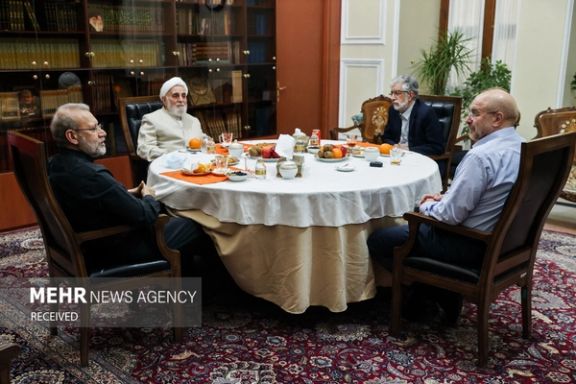What Became Of Parliamentary Speakers In Iran Since 1979?

It is almost clear why so many Iranian lawmakers want to become the speaker of the parliament (Majles). What is not clear is why they want a position that has proved to have no future.

It is almost clear why so many Iranian lawmakers want to become the speaker of the parliament (Majles). What is not clear is why they want a position that has proved to have no future.
According to Arman Melli daily in Tehran, there are at least eight aspirants for the post in the next parliament, including the incumbent Speaker Mohammad Bagher Ghalibaf, former foreign minister Manouchehr Mottaki, hardliner cleric Morteza Agha Tehrani, Qom lawmaker Mojtaba Zolnour, outspoken hardliner lawmaker Hamid Rasaei and others.
This is a post that the daily says anyone who held it for a while, ended up in isolation or worse. Nonetheless, seven politicians have been fiercely fighting each other and particularly against the sitting speaker Ghalibaf even before they won their seat in the new parliament. Among them, Arman Melli argued that Ghalibaf and Mottaki have a better chance to sit on the Speaker’s green seat.
Anyone who wins the post will be in a key position to distribute political power, favors and financial resources among his political allies or others close to him in one way or another. The role is also important for the government as the speaker plays a key part in preventing or allowing impeachment motions. That gives him the leverage to have a say in choosing, hiring and firing cabinet ministers and even other government officials.
The first Majles Speaker in Iran was Akbar Hashemi Rafsanjani who served at the post from July 28, 1980, to 3 August 1989. He was also the chairman of the Expediency Council (for 28 years until 2017), a body tasked with solving problems that the Majles cannot tackle. He was also the chairman of the Assembly of Experts from 2007 to 2011. In 1989 as the deputy chairman of the Assembly, Rafsanjani played a key part in bringing Ali Khamenei to power as the Islamic Republic's Supreme Leader when Ayatollah Khomeini died.
After falling out with Khamenei over the disputed 2009 presidential election that reinstated populist Mahmoud Ahmadinejad, he was disqualified from running in the June 2013 presidential election, and finally died in a swimming pool in January 2017. His role at the parliament is best known for mediating between the country's leading political factions in a way that served his own interests!
The next speaker of the parliament was Ali Akbar Nateq Nouri, a conservative politician and Khatami's political rival in the 1997 presidential election. Nateq Nouri served for two terms as the speaker of the Majles from 1992 to 2000. He acted as a moderate politician who later became the Chief inspector at Khamenei's office, but left the politically significant position when he fell out with Khamenei over the latter's all out support for Ahmadinejad.=
Mehdi Karroubi served in the post from 2000 to 2004. Karroubi's presence as Speaker was marked by turbulent sessions during which he defended reformist lawmakers against the hardliner-dominated Judiciary body. When a lawmaker was imprisoned despite his political immunity, Karroubi threatened to leave the Majles and resign his post. Subsequently the lawmaker, Hossein Loghmanian was released immediately.
He was also a staunch defender of freedom of the press when journalists came under pressure by hardliners during the presidency of Reformist Mohammad Khatami.
Gholam Ali Haddad Adel was the first Majles Speaker in post-revolution Iran who was not a cleric. The Majles under Haddad Adel was a predominantly conservative body, after the Guardian Council had disqualified nearly all the reformist candidates. The press remembers him as a speaker who did almost nothing during his tenure from 2004 to 2008. Nonetheless, he was the luckiest and the only one who remained in Khamenei's inner circle thanks to his daughter marrying Khamenei's son Mojtaba.
The next Majles Speaker was Ali Larijani who served in the post for 12 years from 2008 to 2020. He started his speakership as a conservative lawmaker, but he gradually shifted to the center in 2010s. He strongly stood against Ahmadinejad and played a key role in having the nuclear deal with the West approved by the conservative Majles. Later, like everyone else, he was alienated by Khamenei and his credentials for the 2021 presidential election were rejected by Khamenei's Guardian Council.
In 2020, Ghalibaf won the speaker's seat only after he made a lot of compromises with hardliners including Paydari Party and others such as Alireza Zakani whom he helped to appoint as Mayor of Tehran. Although Ghalibaf submitted to every demand by the Raisi administration, the government is still not happy with the way he managed the parliament during the past four years. Most predictions indicate that he cannot keep his post in the new parliament unless his relative, Ali Khamenei intervenes on his behalf.